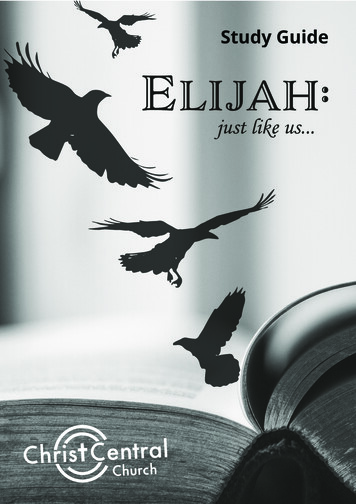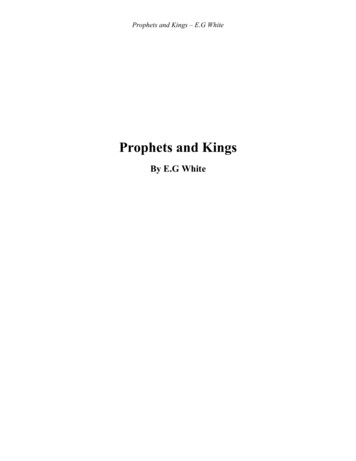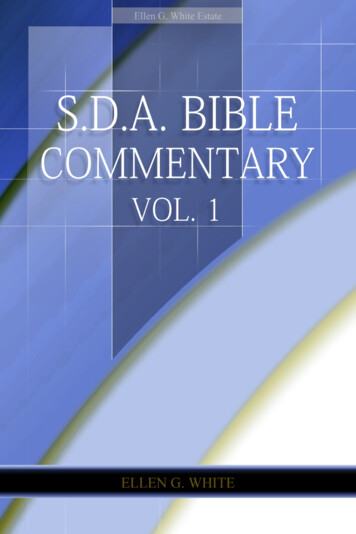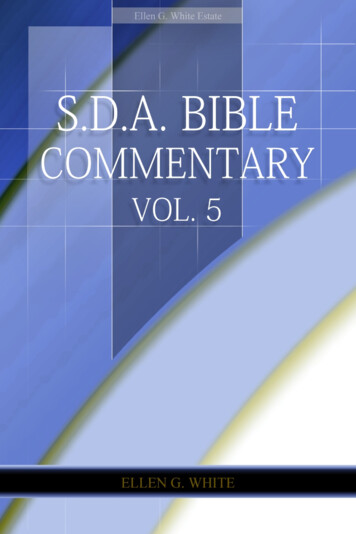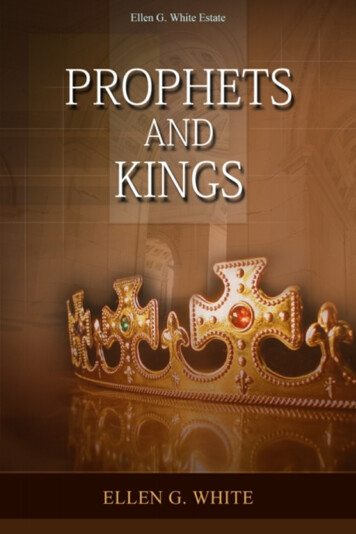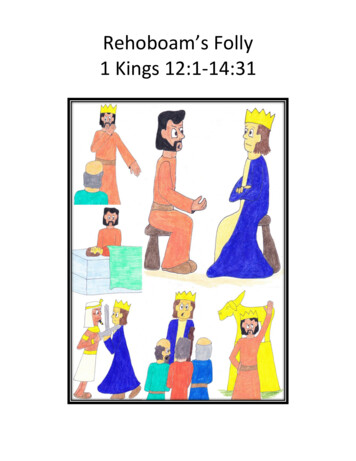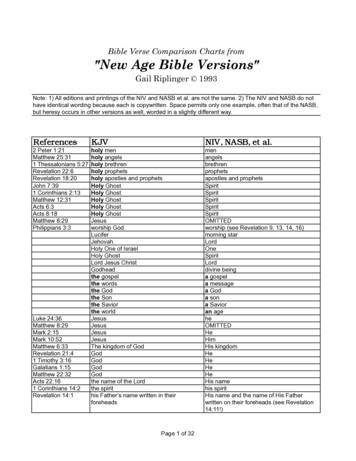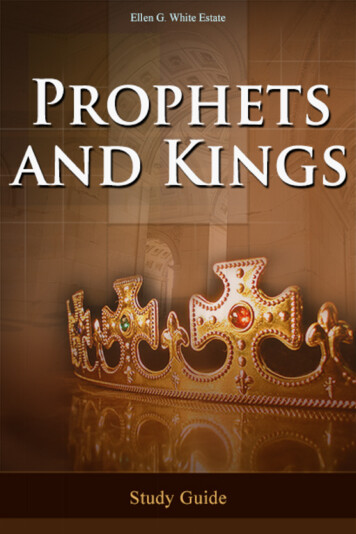
Transcription
Prophets and Kings-- Study GuideEllen G. White Estate2019Copyright 2021Ellen G. White Estate, Inc.
Information about this BookOverviewThis eBook is provided by the Ellen G. White Estate. It is includedin the larger free Online Books collection on the Ellen G. WhiteEstate Web site.About the AuthorEllen G. White (1827-1915) is considered the most widely translatedAmerican author, her works having been published in more than 160languages. She wrote more than 100,000 pages on a wide variety ofspiritual and practical topics. Guided by the Holy Spirit, she exaltedJesus and pointed to the Scriptures as the basis of one’s faith.Further LinksA Brief Biography of Ellen G. WhiteAbout the Ellen G. White EstateEnd User License AgreementThe viewing, printing or downloading of this book grants you onlya limited, nonexclusive and nontransferable license for use solelyby you for your own personal use. This license does not permitrepublication, distribution, assignment, sublicense, sale, preparationof derivative works, or other use. Any unauthorized use of this bookterminates the license granted hereby. (See EGW Writings End UserLicense Agreement.)Further InformationFor more information about the author, publishers, or how youcan support this service, please contact the Ellen G. White Estatei
at mail@whiteestate.org. We are thankful for your interest andfeedback and wish you God’s blessing as you read.ii
ContentsInformation about this Book . . . . . . . . . . . . . . . . . . . . . . . . . . . . . . iIntroduction: The Vineyard of the Lord . . . . . . . . . . . . . . . . . . . . . vChapter 1: Solomon . . . . . . . . . . . . . . . . . . . . . . . . . . . . . . . . . . . . . 6Chapter 2: The Temple and Its Dedication . . . . . . . . . . . . . . . . . . . 7Chapter 3: Pride of Prosperity . . . . . . . . . . . . . . . . . . . . . . . . . . . . . 8Chapter 4: Results of Transgression . . . . . . . . . . . . . . . . . . . . . . . . 9Chapter 5: Solomon’s Repentance . . . . . . . . . . . . . . . . . . . . . . . 10Chapter 6: The Rending of the Kingdom . . . . . . . . . . . . . . . . . . . 11Chapter 7: Jeroboam . . . . . . . . . . . . . . . . . . . . . . . . . . . . . . . . . . . 12Chapter 8: National Apostasy . . . . . . . . . . . . . . . . . . . . . . . . . . . 13Chapter 9: Elijah the Tishbite . . . . . . . . . . . . . . . . . . . . . . . . . . . 14Chapter 10: The Voice of Stern Rebuke . . . . . . . . . . . . . . . . . . . 15Chapter 11: Carmel . . . . . . . . . . . . . . . . . . . . . . . . . . . . . . . . . . . . 16Chapter 12: From Jezreel to Horeb . . . . . . . . . . . . . . . . . . . . . . . . 17Chapter 13: “What Doest Thou Here?” . . . . . . . . . . . . . . . . . . . 18Chapter 14: “In the Spirit and Power of Elias” . . . . . . . . . . . . . 19Chapter 15: Jehoshaphat . . . . . . . . . . . . . . . . . . . . . . . . . . . . . . . . 20Chapter 16: The Fall of the House of Ahab . . . . . . . . . . . . . . . . . 21Chapter 17: The Call of Elisha . . . . . . . . . . . . . . . . . . . . . . . . . . 22Chapter 18: The Healing of the Waters . . . . . . . . . . . . . . . . . . . . 23Chapter 19: A Prophet of Peace . . . . . . . . . . . . . . . . . . . . . . . . . 24Chapter 20: Naaman . . . . . . . . . . . . . . . . . . . . . . . . . . . . . . . . . . . 25Chapter 21: Elisha’s Closing Ministry . . . . . . . . . . . . . . . . . . . . 26Chapter 22: “Nineveh, That Great City” . . . . . . . . . . . . . . . . . . . . 27Chapter 23: The Assyrian Captivity . . . . . . . . . . . . . . . . . . . . . . 28Chapter 24: “Destroyed for Lack of Knowledge” . . . . . . . . . . . 29Chapter 25: The Call of Isaiah . . . . . . . . . . . . . . . . . . . . . . . . . . . 30Chapter 26: “Behold Your God!” . . . . . . . . . . . . . . . . . . . . . . . . . 31Chapter 27: Ahaz . . . . . . . . . . . . . . . . . . . . . . . . . . . . . . . . . . . . . 32Chapter 28: Hezekiah . . . . . . . . . . . . . . . . . . . . . . . . . . . . . . . . . . 33Chapter 29: The Ambassadors From Babylon . . . . . . . . . . . . . . 34Chapter 30: Deliverance From Assyria . . . . . . . . . . . . . . . . . . . . 35Chapter 31: Hope for the Heathen . . . . . . . . . . . . . . . . . . . . . . . 36Chapter 32: Manasseh and Josiah . . . . . . . . . . . . . . . . . . . . . . . . . 37iii
ivChapter 33:Chapter 34:Chapter 35:Chapter 36:Chapter 37:Chapter 38:Chapter 39:Chapter 40:Chapter 41:Chapter 42:Chapter 43:Chapter 44:Chapter 45:Chapter 46:Chapter 47:Chapter 48:Chapter 49:Chapter 50:Chapter 51:Chapter 52:Chapter 53:Chapter 54:Chapter 55:Chapter 56:Chapter 57:Chapter 58:Chapter 59:Chapter 60:Prophets and Kings -- Study GuideThe Book of the Law . . . . . . . . . . . . . . . . . . . . . . . .Jeremiah . . . . . . . . . . . . . . . . . . . . . . . . . . . . . . . . . .Approaching Doom . . . . . . . . . . . . . . . . . . . . . . . . .The Last King of Judah . . . . . . . . . . . . . . . . . . . . . .Carried Captive Into Babylon . . . . . . . . . . . . . . . . .Light Through Darkness . . . . . . . . . . . . . . . . . . . . .In the Court of Babylon . . . . . . . . . . . . . . . . . . . . . .Nebuchadnezzar’s Dream . . . . . . . . . . . . . . . . . . . .The Fiery Furnace . . . . . . . . . . . . . . . . . . . . . . . . . .True Greatness . . . . . . . . . . . . . . . . . . . . . . . . . . . . . .The Unseen Watcher . . . . . . . . . . . . . . . . . . . . . . . .In the Lions’ Den . . . . . . . . . . . . . . . . . . . . . . . . . . .The Return of the Exiles . . . . . . . . . . . . . . . . . . . . .“The Prophets of God Helping Them” . . . . . . . . . .Joshua and the Angel . . . . . . . . . . . . . . . . . . . . . . . .“Not by Might, nor by Power” . . . . . . . . . . . . . . . .In the Days of Queen Esther . . . . . . . . . . . . . . . . . .Ezra, the Priest and Scribe . . . . . . . . . . . . . . . . . . .A Spiritual Revival . . . . . . . . . . . . . . . . . . . . . . . . . .A Man of Opportunity . . . . . . . . . . . . . . . . . . . . . . . .The Builders on the Wall . . . . . . . . . . . . . . . . . . . . .A Rebuke Against Extortion . . . . . . . . . . . . . . . . . .Heathen Plots . . . . . . . . . . . . . . . . . . . . . . . . . . . . . .Instructed in the Law of God . . . . . . . . . . . . . . . . . .Reformation . . . . . . . . . . . . . . . . . . . . . . . . . . . . . . .The Coming of a Deliverer . . . . . . . . . . . . . . . . . . .“The House of Israel” . . . . . . . . . . . . . . . . . . . . . . .Visions of Future Glory . . . . . . . . . . . . . . . . . . . . . 2636465
Introduction: The Vineyard of the Lord1. In the parable of Isaiah 5, God’s original plan for Israelis described. According to this passage, what do the followingrepresent: the vineyard, the plant, the hedge, and the tower?2. As a keeper of God’s vineyard, what can you do in your dailyactivities to give people a true picture of God’s character?3. “In the teachings of the prophets, [God’s] love for the lostrace and His plan for their salvation are clearly revealed.” How doesJonah’s mission to Nineveh demonstrate the truth of this statement?4. As Seventh-day Adventists, what special truth about God’scharacter is revealed by one or more of our distinctive Adventistbeliefs?v
[4]Chapter 1: Solomon1. Read Philippians 2:5-8. Compare Solomon’s request forwisdom with Jesus’ attitude in coming to earth to save mankind.What similarities do you see?2. Solomon “was never so rich or so wise or so truly great aswhen he confessed, „I am but a little child: I know not how to go outor come in.’” What characteristics of a child made Solomon greatand can also make each of us great?3. Solomon faced many difficult decisions, for which he neededgreat wisdom. Do you have specific challenges in your life, forwhich you need special wisdom from God?6
Chapter 2: The Temple and Its Dedication1. What two notable events in Israel’s history took place on Mt.Moriah, where Solomon’s temple was later built?2. What were some important traits of character revealed bySolomon during the dedication of the temple?3. Why is it important to approach God with a sense of reverence?4. Although God cannot be confined to temples or churchesmade with hands, and we must worship Him “in spirit and in truth,”what benefits do you see in gathering at a special place dedicated toHim for worship?7[5]
[6]Chapter 3: Pride of Prosperity1. When Solomon was loyal to God, he displayed great wisdomin restoring a helpless infant to its true mother. What was sadlyironic about Solomon’s choice to worship gods such as Chemoshand Molech?2. Solomon mistakenly thought he could lead his heathen wivesfrom idolatry to the worship of the true God, but they ended updragging him down to their level. What lesson does his examplehave for a Christian who is thinking about dating an unbeliever?3. The prosperity that Solomon enjoyed ultimately became hisundoing. Why can prosperity be dangerous to our spiritual life?8
Chapter 4: Results of Transgression1. In what ways did Solomon’s choice of Huram of Phoenicia tooversee construction of the temple create problems?2. When the Queen of Sheba visited Solomon, what did shesay about Solomon’s wisdom? To whom did she give the credit forSolomon’s wisdom?Prophets and Kings Study Guide3. Within Solomon’s kingdom, highways of commerce providedan opportunity to spread the knowledge of God throughout the world.How is your environment conducive to spreading the gospel?9[7]
[8]Chapter 5: Solomon’s Repentance1. Why couldn’t Solomon’s kingdom be restored to its previousglory and strength after he sincerely repented?2. If seeking earthly things as the mail goal of life brings disappointment and dissatisfaction, why do so many of us do this?3. “In our relation to others . . . every act, every word, is a seedthat will bear fruit.” How have you found this to be true?4. Have there been times of decision in your life when youshould have asked: “Is this the way of the Lord?”10
Chapter 6: The Rending of the Kingdom1. Solomon has been described as the “wisest man who everlived.” Why didn’t his son Rehoboam inherit that wisdom?2. King Rehoboam built fortified cities for defense, but what wasthe secret of Judah’s prosperity during the early years of his reign?3. Rehoboam possessed several negative character traits, but ifhe had “placed his trust wholly in God,” he would have developeda strong character. What negative trait in your own life needs to beremoved with God’s help?4. Think of one person over whom you have great influence.What can you say or do to bring this person closer to Christ?11[9]
[10]Chapter 7: Jeroboam1. What are the dangers of worshiping God through images, asKing Jeroboam did?2. What methods did God use to lead Israel back to Him whenHis people went astray?3. Why did the prophet who rebuked Jeroboam lose his life?4. Has there been a time in your life when you went off courseand God intervened through the counsel of faithful friends or theguidance of the Holy Spirit? How did you respond?12
Chapter 8: National Apostasy1. How different was King Asa’s reaction to invasion from thenorthern kingdom of Israel from his earlier response when the kingof Ethiopia invaded?2. Read 2 Chronicles 14:11. How can relying on God enableyou to overcome the major challenges that you are facing in yourlife?3. What did Ahab do that made him a worse king than Jeroboam?4. Idolatrous Israelites put the god Baal in place of the trueCreator and Sustainer of all nature. How do modern materialism andthe evolutionary theory compare with ancient Baal worship?13[11]
[12]Chapter 9: Elijah the Tishbite1. How did the Israelites react to Elij ah’s warning of impendingfamine?2. How does the persistent response of Jezebel and her people tothe divinely inflicted famine compare to Pharaoh’s response to theten plagues and the Pharisees’ response to Jesus’ miracles? Whatdoes this show about human nature?3. Because Israel would not listen to God’s appeals and warnings,He had to speak to them by judgments, such as famine. Have youexperienced adversity that brought you closer to God?14
Chapter 10: The Voice of Stern Rebuke1. What was the test of faith to which the widow of Zarephathresponded?2. Describe the meetings between Obadiah and Ahab.3. Have you ever risked something important by standing up forwhat was right, as Obadiah did? What was the outcome?4. How can you faithfully rebuke a fellow Christian in such away that he or she will come closer to Christ rather than be drivenaway? Are there times when causing an offense is unavoidable?15[13]
[14]Chapter 11: Carmel1. In what sense is it true that “Elijah is not alone”? How canthis encourage you?2. The prophets of Baal screamed and cut themselves to get their“god” to hear them. How does this compare to what God requires ofus in order to approach Him?3. At Mt. Carmel, God performed a miracle. But in these lastdays, what will happen if we trust in miracles alone as evidence ofGod’s work?4. As you examine your life, are there any areas in which you are“halting between two opinions?” How can you make a wise choice?16
Chapter 12: From Jezreel to Horeb1. How can we have “large faith” as Elijah did? What will bethe result?2. What might have happened if Elijah’s faith had not waveredwhen Jezebel threatened his life?3. What sometimes causes a spiritual lull following a spiritualhigh? How can we handle this?4. “For the disheartened there is a sure remedy—faith, prayer,work.” How do each of these three elements work to change yourstate of mind?17[15]
[16]Chapter 13: “What Doest Thou Here?”1. What are some similarities between the apostate condition ofthe world in the time of Elijah and today?2. “Nothing is apparently more helpless, yet really more invincible, than the soul that feels its nothingness and relies wholly onGod.” Are you finding this to be true?3. How should church leaders react “when everything looksdark”?18
Chapter 14: “In the Spirit and Power of Elias”1. How is God’s law like a signpost?2. What blessings and protection result from observing thebiblical seventh-day Sabbath?3. Of what is the Sabbath a sign? Why is this especially important near the Second Coming of Jesus?19[17]
[18]Chapter 15: Jehoshaphat1. What reforms did King Jehoshaphat initiate?2. Although Jehoshaphat at times displayed poor judgment, Godstill protected him when he called for help. How does his storyencourage you?3. For victory, Jehoshaphat relied on the Lord rather than onhis well-prepared military defenses. What can we learn from hissuccess?4. Jehoshaphat’s victorious army was led by a choir singingpraises to God. What is the point of praising God when you knowthat you are about to meet great difficulties?20
Chapter 16: The Fall of the House of Ahab1. Was Ahab responsible for Naboth’s death, even though hewas not directly involved in Jezebel’s plot against Naboth?2. Because Ahab humbled himself when Elijah rebuked himregarding Naboth, the Lord reduced the king’s punishment. Whatdoes this tell us about God’s mercy?3. Why did King Ahaziah seek help from the pagan god Baalzebub rather than help from God? Why do many people turn forhelp to occult sources rather than to the Lord?4. What are subtle forms of occultism, paganism, and/orspiritism (e.g., through entertainment) to which you and your familymembers are exposed? What can you do to protect yourself andyour family from these influences?21[19]
[20]Chapter 17: The Call of Elisha1. What were the positive character traits that Elisha developedas a farmer?2. How did Elisha’s faithfulness in small things prepare him tohandle larger responsibilities? How does the same principle work inyour life?3. “Success depends not so much on talent as on energy andwillingness.” Why is this true?4. How does knowing that Moses and Elijah were taken toheaven strengthen your faith?22
Chapter 18: The Healing of the Waters1. “Many are the spiritual lessons to be gathered from the storyof the healing of the waters. The new cruse [i.e., bowl or jar], thesalt, the spring—all are highly symbolic.” What do these thingssymbolize?2. What happens if a Christian receives only without giving orattempts to give only without receiving?3. How can understanding the “spring of life” concept help youwhen you are feeling spiritually dry?4. What does “drinking from Jesus” really mean? What can youdo each day to ensure that you continue to drink from Him?23[21]
[22]Chapter 19: A Prophet of Peace1. How did Elisha’s mission differ from that of Elijah?2. What miracles performed through Elisha were strikinglysimilar to miracles later performed through Christ? What is thereason for this similarity?3. Has Christ supplied your needs (e.g., spiritual, physical,financial) through other people? Has He used you to supply theneeds of others?4. How do the stories of Elisha and Christ encourage us whenwhile doing God’s work we run short of resources?24
Chapter 20: Naaman1. The captive Israelite girl’s conduct in the foreign householdof Naaman is a “strong witness to the power of early home training.”How do parents contribute to their child’s understanding of God?2. Why did God want Naaman to bathe in the Jordan River?3. Why did Elisha refuse payment from Naaman for his healing?How did Gehazi undermine the message that Elisha was attemptingto convey?25[23]
[24]Chapter 21: Elisha’s Closing Ministry1. Although there seemed no escape, Elisha’s servant was allowed to see protective horses and chariots of fire. How does thisexperience encourage us?2. What can we learn from the test of faith that Elisha gave toKing Joash?3. How can we gain devotion, zeal, courage, and a love forsouls?4. Faithful Elisha died after suffering from a lingering illness.What can those who suffer despite their faithfulness to God learnfrom his experience?26
Chapter 22: “Nineveh, That Great City”1. What was Jonah thinking, and how was Satan affecting him,when he tried to escape the responsibility that God gave to him?2. Why was Jonah displeased when God spared Nineveh?3. Do you see the results of God gradually withdrawing HisSpirit from the world as people continue to reject His mercy?4. How is God working in the city nearest to where you live?What can you do to help?27[25]
[26]Chapter 23: The Assyrian Captivity1. Why does false worship appeal to sinful human nature? Whydoes it lead to destruction?2. What are the evils against which the Hebrew prophets spoke?3. What was the Lord’s purpose in bringing various judgmentson His people before they were finally taken captive?4. How has God shown his mercy and patience toward you?28
Chapter 24: “Destroyed for Lack of Knowledge”1. What did Satan fail to take into account when he made repeated attempts to seduce the chosen nation into apostasy throughidolatry?2. Although God is incredibly merciful, what can we learn fromevents, such as the Flood and Sodom and Gomorrah, regarding theconsequences of persistent human rebellion?3. After the Assyrians conquered and scattered the ten tribes ofnorthern Israel, how did God fulfill His plan to restore the promisedcovenant blessings?4. How does Christ enable you to obey God, even though yourown willpower is inadequate?29[27]
[28]Chapter 25: The Call of Isaiah1. What was the economic and spiritual condition of Judahwhen God called Isaiah to prophetic ministry? Do you see similareconomic and spiritual conditions today? What is the relationshipbetween these conditions?Prophets and Kings Study Guide2. What vision did Isaiah see at the temple, and how did herespond? How would you have reacted, and how does this visionaffect your view of reality?3. Did God promise Isaiah that his ministry would be successful? How should we measure success as we take the good news ofsalvation through Jesus Christ to others?30
Chapter 26: “Behold Your God!”1. How does Satan misrepresent God’s character? How has Godrevealed His true character to you?2. How is the prophecy that the entire earth will be filled withGod’s glory being progressively fulfilled today? Can you contributeto its fulfillment?3. How pure and worthy should you be before you come toChrist?31[29]
[30]Chapter 27: Ahaz1. What appalling conditions prevailed during the reign of KingAhaz in Judah?2. In what ways are modern Christians still “in danger of fallinginto habits of formalism and of forgetting to show mercy”? Why dopeople prefer formalism to mercy?3. According to Christ, what are the two basic principles ofGod’s law? How does this affect your desire to keep God’s commandments?4. How did the faithlessness of Ahaz at a time of crisis lead todisaster for his nation? What can we learn from his mistakes?32
Chapter 28: Hezekiah1. What was the state of the temple and its services at thebeginning of the reign of King Hezekiah? How did Hezekiah respondto this situation?2. Why had the people of Israel and Judah not been keepingPassover as a national festival? Why did Hezekiah want to revive itsobservance?3. When the Holy Spirit and the presence of Christ refreshes andrevives us in corporate worship, how do we carry this experienceback to our homes? What practical difference does it make in ourlives?4. If Hezekiah had not been a man of faith and a reformer, whatwould have happened to God’s people at this dangerous time in theirhistory?33[31]
[32]Chapter 29: The Ambassadors From Babylon1. What miracle did God perform to give Hezekiah a sign thathe would be miraculously healed?2. What opportunity for sharing God did the miraculous signbring to Hezekiah? How did he miss it, and what was the result?3. Why do we as humans exert such powerful influences overone another?4. Has God done great things in your life that you can share withothers?34
Chapter 30: Deliverance From Assyria1. In preparing Jerusalem for an attack by the Assyrians, howdid Hezekiah cooperate with God?2. Why is it true that “nothing more quickly inspires faith than theexercise of faith”? Have you found this true in your own experiencewith God?3. How did Hezekiah react to threatening messages sent tohim by the Assyrian leaders? How would you react in such anemergency?4. What can modern nations and individuals learn from the prideof Assyria and its fall?35[33]
[34]Chapter 31: Hope for the Heathen1. What was God’s purpose in choosing and blessing the childrenof Abraham?2. What does the fact that God “is the Maker of all mankind . . and all are one through redemption” tell us about His attitudetoward racial discrimination?3. How did the prophet Isaiah encourage the Lord’s people towelcome others from all nations to worship the true God? In whatway have you been welcomed into the community of Christ? Doyou welcome others, even if they differ from you and do not belongto your culture?36
Chapter 32: Manasseh and Josiah1. To what extent does God’s forgiveness, as when He forgaveManasseh, wipe out the bad results of what we have done?2. How does the frankness of Habakkuk’s cry to God affect yourconfidence to pray what is on your mind?3. Read Zephaniah 1:14-16. How does this prophecy of “thegreat day of the Lord” apply to people who live on earth when Christcomes a second time?37[35]
[36]Chapter 33: The Book of the Law1. Josiah cleaned up Judah by getting rid of objects associatedwith idolatry. How can you remove the spiritual garbage from yourlife? Why is it important to do this?2. King Josiah showed respect for the Prophetess Huldah. Whoare the Lord’s messengers today? How do we show them respect?3. Why was King Josiah’s reform not enough to prevent thedestruction and exile of the kingdom of Judah?4. Why can’t our zeal for removing evil, as good as it is, atonefor our past failures? How does this point to the need for atonementthrough the sacrifice of Christ?38
Chapter 34: Jeremiah1. God chose Jeremiah when he was very young. Does Godcontinue to call young people to His service?2. Why do you think God chose the prophet Jeremiah, who wasnaturally “of a timid and shrinking disposition”? Can God still useshy people to do a great work for Him?3. Why does God go to such trouble to warn and reach out tothose who reject Him? What does this say about His mercy and Hisdesire to give everyone the right to make a free choice, even if it isthe wrong one?39[37]
[38]Chapter 35: Approaching Doom1. God had forbidden the Rechabites to drink wine, yet Jeremiahbrought them into the temple and invited them to drink. Why didJeremiah do this? What lesson does God want us to learn from thisstory?2. God told Jeremiah to break a pottery bottle in the Valley ofHinnom. Why does God communicate through object lessons suchas this?3. Why did God want King Jehoiakim to act loyally toward KingNebuchadnezzar, even though the Babylonian king was a paganidolater?40
Chapter 36: The Last King of Judah1. How did Jeremiah dramatically emphasize to a council ofnations that they should submit to Babylon? What was the response?2. Why did King Zedekiah rebel against Nebuchadnezzar, inspite of the warnings of Jeremiah and Ezekiel? Are there times in ourlives when we need to submit to God’s discipline so that somethingworse will not happen?3. How does Christ’s kingship contrast with that of KingZedekiah?41[39]
[40]Chapter 37: Carried Captive Into Babylon1. Why did Zedekiah seek information from Jeremiah privately,even though he was not following the prophet’s counsel?2. Do you have a relationship with Christ that gives you strengthto resist evil?3. The people of Babylon destroyed Solomon’s temple. Whathappened to the sacred Ark of the Covenant, containing the TenCommandments on tablets of stone?4. God showed His mercy even though Jerusalem and its templewere destroyed and many of the people of Judah were exiled toBabylon. Have you seen God’s mercy in your life, even when badthings happen?42
Chapter 38: Light Through Darkness1. Why does reverence for God’s holy Word make such a difference in peoples’ lives? Are you passing God’s Word on to the nextgeneration by teaching it to your children and other young people?2. Why did Jeremiah buy land outside Jerusalem when it wasalready under control of the Babylonians and Judah was about to beconquered? Wasn’t he just throwing away his money?3. Jeremiah’s prophecy of a “new covenant” pointed to a renewedrelationship with God through Jesus. During times of great troubleto what extent can we trust God to fulfill His covenant promises tous?43[41]
[42]Chapter 39: In the Court of Babylon1. What does it mean to say that Daniel and his companions“lived their prayers”? How can you follow their example?2. Daniel and his friends refused to eat the king’s unclean food.Why is physical self-control in the area of appetite vitally important?3. The story of Daniel and his friends shows us the impact thatfollowers of God, who pursue excellence for His glory, can have inthe world, even among the rich, powerful, and famous. What wasthe key to their success? How may we follow their example?44
Chapter 40: Nebuchadnezzar’s Dream1. God revealed to King Nebuchadnezzar His power over thekingdoms of this world. Is this message still true? How has Godrevealed His power in the nations of our day?2. The prophecy of Daniel 2 teaches that God has foreknowledgeof human history—even hundreds and thousands of years beforeevents happen. What does this teach us about God’s ability toaccomplish the “counsels of His own will” in these last days?3. The story of Daniel and the Babylonian wise men shows usthe value of human and occult sources of knowledge in comparisonwith the wisdom of God. In your daily life, do you first consult thenews media and other people’s opinions to explain the present andfuture, or do you search the Bible and inspired writings to understandcontemporary events?45[43]
[44]Chapter 41: The Fiery Furnace1. Why did Nebuchadnezzar order construction of a huge andmagnificent image made entirely of gold?2. The king commanded all of his subjects to bow before theimage he had made. What gave Daniel’s three friends the courageto refuse to obey even if it meant their death in a fiery furnace?Sometimes nations make laws that require disobedience to God. Doyou have an obligation to obey God, even if it leads to punishmentor death?3. After casting the three men into the fire, the king observed thatfour people were walking in the fire. Who was the fourth Person?In the last days, God’s people will experience trials similar to thosefaced by the three young men. What will carry them through theseexperiences?46
Chapter 42: True Greatness1. Through a dream and Daniel’s prophetic interpretation, Godmercifully warned Nebuchadnezzar of pride. How does God warnus when we are in spiritual danger?2. In the battle between good and evil, why is pride a seriousproblem?3. Do you and your leaders know and live according to theprinciple “that true greatness consists in true goodness”? How didJesus demonstrate this principle in His life on earth?4. The story of Nebuchadnezzar shows God’s patience andmercy. In what ways has God been patient and merciful to you?47[45]
[46]Chapter 43: The Unseen Watcher1. The writing on the palace wall decreed the final judgment ofBabylon. Why didn’t God give King Belshazzar another opportunityto repent and change his ways? What does this teach us about theway God works with nations and people?2. How did the conquest of Babylon by the Medes and Persiansfulfill Hebrew prophecies and show that God knows the future?3. In what ways do we see prophecy fulfilling through eventsoccurring in our day?48
Chapter 44: In the Lions’ Den1. Read Daniel 6:4, 5, 10. Daniel was strictly honest in hisbusiness dealings and refused to compromise his faith, even whenin physical danger. What lessons can you draw from this storyregarding your personal business dealings and public service?2. God could have prevented Daniel from being thrown into thelions’ den. Why does God allow us to suffer danger and trial whenHe could prevent it?3. Why should w
Ellen G. White (1827-1915) is considered the most widely translated American author, her works having been published in more than 160 languages. She wrote more than 100,000 pages on a wide variety of spiritual and practical topics. Guided by the Holy Spirit, she exalted Jesus and pointed to the Scriptures as the basis of one's faith. Further .
